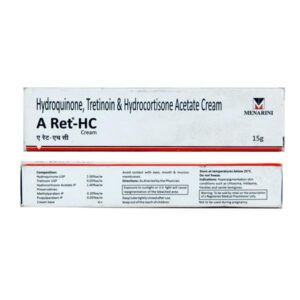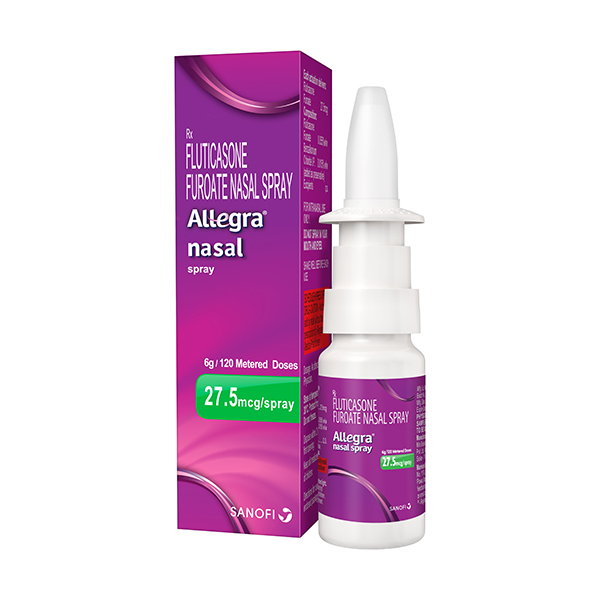ALLEGRA NASAL SPRAY 120MD
KEY BENIFITS,
- Nasal Symptom Relief: Allegra Nasal Spray provides effective relief from nasal congestion, sneezing, runny or itchy nose, and nasal itching caused by allergic rhinitis.
- Anti-inflammatory Action: Fluticasone Furoate reduces inflammation and swelling in the nasal passages, helping to relieve symptoms and improve nasal airflow.
- Long-lasting Relief: With regular use, Allegra Nasal Spray offers long-lasting symptom relief, providing comfort throughout the day.
₹397.00
CompareProduct Introduction:
Allegra Nasal Spray contains the active ingredient Fluticasone Furoate at a concentration of 27.5mcg per spray. It is a corticosteroid medication used to treat symptoms associated with allergic rhinitis, including nasal congestion, sneezing, runny or itchy nose, and nasal itching. Fluticasone Furoate works by reducing inflammation and swelling in the nasal passages, thereby alleviating symptoms of allergic rhinitis.
You should always use it as advised by your doctor but to get the full benefit you should take it regularly. It may take a few days for the spray to take full effect. If you do not see an improvement in your symptoms after a week you should talk to your doctor.
The most common side effects of Allegra Nasal Spray include nasal discomforts such as burning or itching. It can also cause nosebleeds, nasal inflammation, and headaches in some patients. Talk to your doctor if you are worried about side effects or they do not go away. This medicine may lower the ability of your body to fight off infections, so try to stay away from someone having chickenpox, measles, or tuberculosis. In general, you should try to avoid situations which make your symptoms worse (things like pollen and dust mites), and it would be best to avoid smoking.
Before starting to use this medicine you should let your doctor know if you are pregnant or breastfeeding, discuss the risks and benefits with your healthcare team. If you use this medicine for a long time, your doctor may want to carry out certain medical tests during the duration of treatment to check your progress.
Benefits:
- Nasal Symptom Relief: Allegra Nasal Spray provides effective relief from nasal congestion, sneezing, runny or itchy nose, and nasal itching caused by allergic rhinitis.
- Anti-inflammatory Action: Fluticasone Furoate reduces inflammation and swelling in the nasal passages, helping to relieve symptoms and improve nasal airflow.
- Long-lasting Relief: With regular use, Allegra Nasal Spray offers long-lasting symptom relief, providing comfort throughout the day.
Side Effects:
Common side effects of Allegra Nasal Spray may include:
- Nasal irritation or dryness
- Nosebleeds
- Headache
- Sore throat
- Sneezing
- Cough
- Unpleasant taste or smell
Severe side effects are rare but may include:
- Severe nasal irritation or bleeding
- Eye pain or vision changes
- Signs of adrenal insufficiency (e.g., fatigue, weakness, dizziness)
- Allergic reactions such as rash, itching, swelling of the face, tongue, or throat, severe dizziness, or trouble breathing.
If you experience any severe side effects or symptoms of an allergic reaction, seek medical attention immediately.
Usage Guidelines:
- Shake the Allegra Nasal Spray bottle gently before each use.
- Blow your nose gently to clear the nasal passages before using the spray.
- Insert the nasal applicator tip into one nostril while tilting your head slightly forward.
- Close the other nostril with your finger and aim the spray away from the nasal septum.
- Breathe in gently through the nostril while pressing down on the spray pump to release the medication.
- Repeat the process for the other nostril.
- Do not blow your nose immediately after using the spray to allow the medication to be absorbed properly.
- Use Allegra Nasal Spray regularly as directed by your healthcare provider for optimal effectiveness.
Drug Interactions:
Before using Allegra Nasal Spray, inform your doctor about all other medications you are taking, including prescription, over-the-counter, vitamins, and herbal supplements, to avoid potential interactions. Some medications that may interact with Fluticasone Furoate nasal spray include:
- Other corticosteroid medications
- Ketoconazole or other antifungal medications
- Certain HIV protease inhibitors
- Certain antibiotics such as clarithromycin or erythromycin
Always consult your healthcare provider for personalized advice on drug interactions and usage guidelines.
You should always use it as advised by your doctor but to get the full benefit you should take it regularly. It may take a few days for the spray to take full effect. If you do not see an improvement in your symptoms after a week you should talk to your doctor.
The most common side effects of Allegra Nasal Spray include nasal discomforts such as burning or itching. It can also cause nosebleeds, nasal inflammation, and headaches in some patients. Talk to your doctor if you are worried about side effects or they do not go away. This medicine may lower the ability of your body to fight off infections, so try to stay away from someone having chickenpox, measles, or tuberculosis. In general, you should try to avoid situations which make your symptoms worse (things like pollen and dust mites), and it would be best to avoid smoking.
Before starting to use this medicine you should let your doctor know if you are pregnant or breastfeeding, discuss the risks and benefits with your healthcare team. If you use this medicine for a long time, your doctor may want to carry out certain medical tests during the duration of treatment to check your progress.
| Weight | 0.5 kg |
|---|---|
| Dimensions | 10 × 10 × 10 cm |
Related products
-
Medicines
A Ret HC Cream 15gm, Advanced Formula Skin Care with Hydroquinone (2% w/w), Tretinoin (0.05% w/w) and Hydrocortisone (1% w/w)
 Medicines
MedicinesA Ret HC Cream 15gm, Advanced Formula Skin Care with Hydroquinone (2% w/w), Tretinoin (0.05% w/w) and Hydrocortisone (1% w/w)
0 out of 5(0)MARKETERA. Menarini India Pvt LtdSALT COMPOSITIONHydroquinone (2% w/w) + Tretinoin (0.05% w/w) + Hydrocortisone (1% w/w)STORAGEStore below 25°CKey Features & Benefits
- Superior Blend: A combination of Hydroquinone (2% w/w), Tretinoin (0.05% w/w) and Hydrocortisone (1% w/w) offering a multiplicative benefits.
- Diverse Usage: It can be used to gain relief from skin darkening (hyperpigmentation), acne, and inflammatory skin conditions.
- Long-lasting: A little goes a long way! The 15gm tub offers extended usage even with regular use.
SKU: n/a


